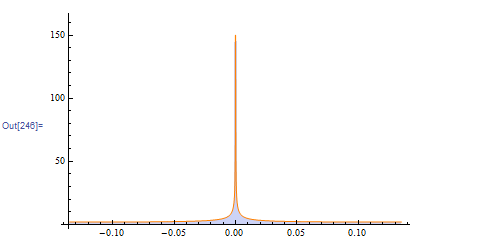Bug introduced in 8.0.1 and fixed in 10.2.0
Let $X$ be a random variable with pdf:
dist = ProbabilityDistribution[1/(Abs[x]*Log[Abs[x]]^2), {x, -E^-2, E^-2}]
Here are some pseudo-random drawings from it:
data = RandomVariate[dist, 500000];
The domain of support for this random variable is:
{x, -E^-2, E^-2} // N
{x, -0.135335, 0.135335}
and all the generated data should lie within this domain of support. But, if I try something like:
Max[data]
0.15312
Mathematica 9 returns a number which lies outside the domain of support. So, the Mathematica random number generator is failing — it is generating values that lie outside the domain of support: i.e. not from this pdf.
I reported this under version 8 to WRI, and again under version 9 pre-testing and since it is still here, I am beginning to wonder whether it is just me? Do others get this problem as well? I am running a Mac Pro with OS X 10.6.8


dist2 = ProbabilityDistribution[ 2/(Abs[x]*Log[Abs[x]]^2), {x, 0, Exp[-2]}]. $\endgroup$